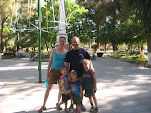 |
| An overlook part way up the steep climb through the Western Ghats. A coastal range of numerous nature and tiger reserves. An incredible environment to cycle through! |
 |
| Monkeys and ancient columns at the temple complexes, Hampi, Karnataka. |
 |
| Small scale farming amongst the nature reserves of the Western Ghats. |
 |
| The textile factory where all the official government flags of India are sewn. The fabric is hand loomed from hand spun cotton, likely from the local cotton fields we've cycled by in the past days. |
 |
| Village kids on bikes. I am buying nuts and raisins from a general store just adjacent when this pic was taken. |
 |
| Riding through banyon tree shade. |
 |
| Lots of huge oxen share the road with us. Additionally, tractors chug by pulling wagons towered with hay. The loud music they project is a fun break from the more common sounds of moped horns. |
 |
| Markos overlooking the rice terraces near Hampi, Karnataka. |
We dove inland into India leaving the west coast at Karwar, Karnataka and climbing up the steep switchbacks of the Western Ghats. The incredible jungle of trees shading the road sidetracked the sweat and exhaustion of the ride. We rode through the Kali Tiger Reserve (no sightings) and several forest reserves, camping at a tiny, quiet village school when the Eco-camp said they were "Full" (the place looked vacant). Days that followed opened changing landscapes. Small fields of rice terraces, ox-pulled wagons towering with sugarcane. Dry, flat, headwind savannas. Clean, neat, well-kept villages, trash piles and rummaging pigs on the outskirts of towns. Rough, broken roads, smooth, fresh pavement. Hundreds of passing mopeds, many slowing to chat "What country? What your name?" We never know what exactly we'll come across in the day ahead.
Bike snacks: little bananas, oranges, pomegranates, the daily mix of raisins and nuts (almonds, cashews, groundnuts, pistachios) and dates
Breakfasts: rice, nuts and bananas; oatmeal with raisins, pomegranate seeds and bananas; egg dish with potatoes, tomatoes, onions and garlic
Lunches: Veg Thali, Masala Dosa and cold drinks (Fanta, Limca, water)
Dinners: dal, curries, chipati, roti, biryani, Sambhar and Rosan, tandoori chicken, Tarn's favourite - Veg Manchuri Soup and concoctions of local vegies (eggplant, tomatoes, potatoes, green chilies, garlic and onion) with rice when we cook over our campstove
Boys are busy with semester wrap-up of distance learning school. Final exams will be in January. Bike by day, school by night. With the variety of unknown opportunities that come up with each day, (last night we camped out in a school classroom and were hosted for dinner with the 63 Standard 10 boys who live at the school hostel). Sampson, Markos and Tarn don't take week ends off school but forge on, doing school whenever they can. The incomparable education on the road they experience daily is priceless.
Happy Holidays!!! We'll find a unique way to celebrate Christmas this year!





















